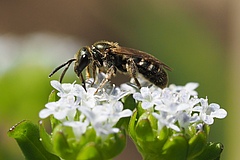01.12.2016 | Research
Pollinators in distress

A narrow beard (Lasioglossum sp.) on the flower of the common field salad (Valerianella locusta). More than 20,000 species of bees are known worldwide. They pollute more than 90 percent of the 107 most important crops. Photo: Felix Fornoff, University of Freiburg
Note for the media: Use of the pictures provided by iDiv is permitted for reports related to this media release only, and under the condition that credit is given to the picture originator.
Simon G. Potts, Vera Imperatriz-Fonseca, Hien T. Ngo, Marcelo A. Aizen, Jacobus C. Biesmeijer, Thomas D. Breeze, Lynn V. Dicks, Lucas A. Garibaldi, Rosemary Hill, Josef Settele, Adam J. Vanbergen (2016): Safeguarding pollinators and their values to human well-being, Nature, Advance Online Publication vom 28.11.2016. DOI: 10.1038/nature20588
http://www.nature.com/nature/journal/vaop/ncurrent/full/nature20588.html
